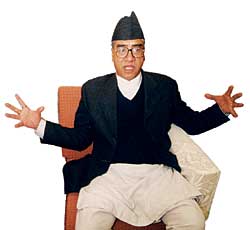 It's Sunday afternoon as I write this, and the prime minister's plane is roaring overhead, off to pay homage in Washington and London and court some cash from the paymasters of the war on terror. The few private airlines still flying send their trickle of passengers hither and yon. It's misty and warm, a pigeon perches on my balcony, keeping a wary eye on the cat down below.
It's Sunday afternoon as I write this, and the prime minister's plane is roaring overhead, off to pay homage in Washington and London and court some cash from the paymasters of the war on terror. The few private airlines still flying send their trickle of passengers hither and yon. It's misty and warm, a pigeon perches on my balcony, keeping a wary eye on the cat down below. Hard to know what to make of things now that I'm back in the Himalayan kingdom. Being abroad, in North America and Europe, meant logging onto the Internet-everyday-and checking out nepalnews.com to read this paper and all the others. Another reminder of our yam-like status between the two boulders was a copy of Samrat Uphadyay's Arresting God in Kathmandu, prominently displayed in my local book super store. I bought it to read on the plane home.
It's probably a good thing Prime Minister Deuba is meeting President Bush this week in Washington. The CEO of America Inc was infamously the man most ignorant about foreign affairs in the run up to the presidential election in 2000. Post 11 September, he no longer needs an atlas to suss out all corners of the world. He even knows about our troubles in Nepal and is investing in ways to resolve them. Forty million dollars and counting, unless I'm mistaken, with at least half for the military. That's an interesting intervention at this point in the struggle and one that I'm worried isn't being properly examined and debated here.
It is in America though. A ringing telephone in my father's kitchen last week turned out to be a producer with National Public Radio, America's superb listener-supported alternative to the dreck of mainstream media. Somehow, "Talk of the Nation" had tracked me down in exotic Uxbridge, Ontario, Canada and this week, the listeners were getting all they may have ever wanted to know about Nepal and the Maoists. I was there as a journalist, so I refrained from offering opinions, but the surprisingly well-informed listeners didn't.
To a person, they all oozed fear that the Bush administration was being too black and white in its widening of the war on terror to include Nepal and the Maoist insurgency. That's what they felt the White House was doing with its request for extra military assistance for the authorities here, and they didn't like it. I pointed out that the official American line, that democracy is under threat and must be supported, has more than a ring of truth about it. But people like Professor Catherine Marks, a Nepal expert from Cornell University, and a listener named Ursula, calling from Providence, Rhode Island, were having none of it. "Our money," Ursula said, (she was a former Peace Corps volunteer who'd roamed all through the Karnali area over the past two years) "shouldn't be spent on furthering war and violence. It should be spent on making peace, encouraging institutions like the courts, parliament and human rights groups. We have spent decades providing weapons to developing countries and all that happens is the enriching of shareholders in American defence firms."
A forceful point, probably made from a left-of-centre ideological perspective, but a thoughtful one nonetheless, especially coming from an informed source and from a person who clearly loves this country. She deplored the Maoists and their violence but wondered about the rural poverty she'd seen, the alienation of remote valleys cut off from the prosperity so prevalent-until recently-in Kathmandu. Professor Marks concurred. She too is widely travelled in the far-west, far more I dare say, than many of the elite in this city, certainly more than I.
Debate is the key thing here. No side is absolutely right, no one is utterly wrong, save those who urge violence and only violence as the answer to our problems. People need to start talking about how to resolve those woes, they need to disagree and then move towards common ground. That's democracy, that's pluralism, that's the only way forward. That American phone-in program needs a version in Nepali, and it needs to be broadcast nation-wide as the people of this fine, troubled land have their say.
By the way, Professor Marks and Ursula from Rhode Island both speak fluent Nepali and are more than willing to share their opinions with people here.
(www.npr.org, Talk of the Nation Programme, 29 April 2002)



